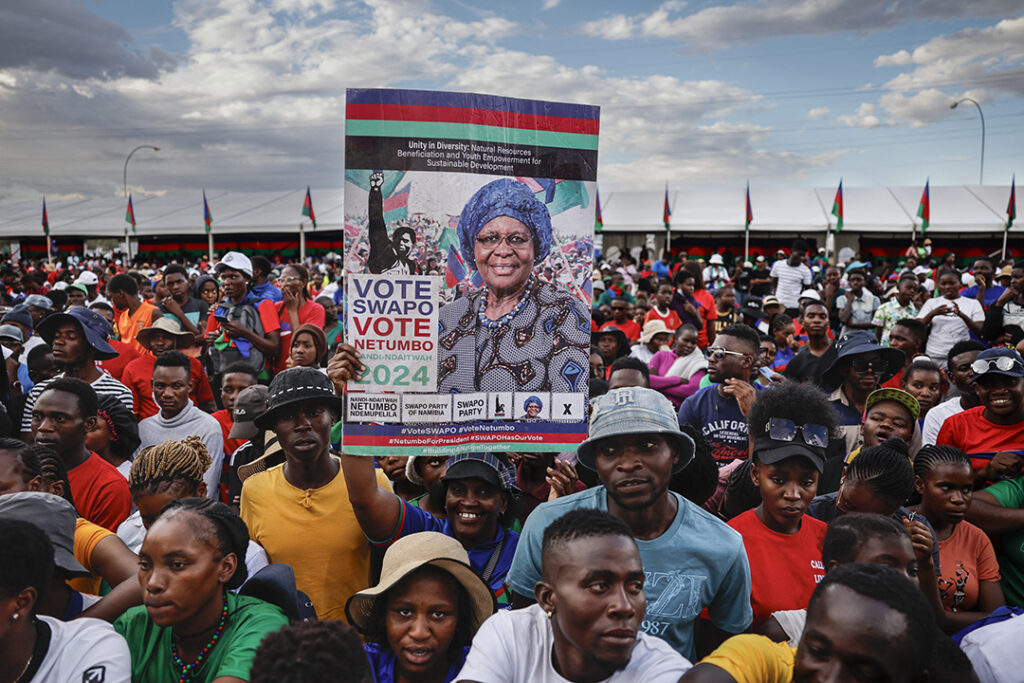
Namibia’s Vice President, Netumbo Nandi-Ndaitwah, was among the first to vote in Wednesday’s elections, which could make her the country’s first female president. This comes as her ruling party, SWAPO, faces its toughest challenge in 34 years of dominance.
At 72, Nandi-Ndaitwah, a veteran of the South West Africa People’s Organisation (SWAPO), cast her ballot in Windhoek, the capital, where long queues formed outside many polling stations. She urged the 1.5 million registered voters to cast their votes before the polls close at 9:00 pm (1900 GMT).
“The outcome of this vote will shape the next five years, not just for Namibians but for anyone visiting this country,” said Nandi-Ndaitwah, who is widely known as NNN.
Since independence in 1990, SWAPO has governed Namibia, a mineral-rich nation, but it now faces widespread discontent over high unemployment and persistent inequalities. If Nandi-Ndaitwah fails to secure at least 50% of the vote, she may face an unprecedented second round of voting.
One of her key challengers is Panduleni Itula, 67, a former dentist and lawyer who left SWAPO to found the Independent Patriots for Change (IPC) party in 2020. In the 2019 elections, Itula won 29% of the vote, a significant improvement over SWAPO’s leader Hage Geingob, who won 56%. Geingob passed away earlier this year.
Itula, speaking at a polling station in Windhoek, expressed confidence that his four-year-old party could “unseat the revolutionary movement” and bring about a new era in Namibian politics.
“I am hopeful that we will march towards a new dawn of public affairs in this country,” Itula said.
Among the voters was 31-year-old Frieda Fillipus, who works in the mining sector. “The future is female,” said Fillipus, voicing her desire to see a woman lead the country.
For 32-year-old self-employed Hendry Amupanda, who had been queuing since the previous evening, the election outcome seemed too close to call. “I want the country to improve and for more jobs to be created,” he said.
Political analysts suggest that, for the first time in Namibia’s recent history, a second round of voting could be a realistic possibility. Henning Melber from the Nordic Africa Institute noted that a run-off would take place within 60 days of the first-round results, which are expected to be announced on Saturday.
Despite its wealth in uranium and diamonds, Namibia’s nearly three million people have not all benefited equally. “Mining activity has not translated into better infrastructure or job opportunities,” said independent political analyst Marisa Lourenco. “This is where much of the frustration, particularly among the youth, is coming from.”
Youth unemployment in Namibia is a pressing issue, with an estimated 46% of 15- to 34-year-olds unemployed—almost three times the national average.
SWAPO, which led Namibia to independence from South African rule in 1990, now faces uncertainty, as liberation-era movements across the region have struggled with generational shifts. In the past six months, South Africa’s African National Congress lost its parliamentary majority, and Botswana’s Democratic Party was ousted after nearly six decades in power. Mozambique’s ruling Frelimo, despite winning the most recent election, has faced protests over alleged fraud.
“Young people are feeling the impact of the economic downturn in many African countries,” said Nic Cheeseman, an African politics professor at the University of Birmingham. “It’s not just that they’re young, but they’re also feeling the economic strain.”
Tendai Mbanje, an election expert at the African Centre for Governance, emphasized that the economic challenges affecting Namibia, and other African nations, are drastically shifting the political landscape.
